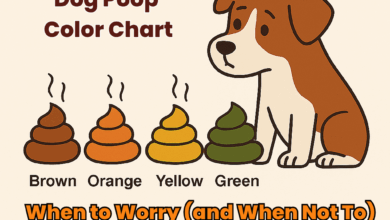CBD Isn’t The Whole Story: What The ‘Entourage Effect’ Means For Your Dog’s Pain & Anxiety
When you purchase through links on our site, we may earn a commission. Here’s how it works.
In a world where our dogs are more than pets—they’re family—it’s no wonder so many of us are searching for safe, natural ways to help them live longer, healthier, and happier lives. Enter CBD oil: a powerful plant-based tool with real potential to improve canine wellness.
Table of Contents
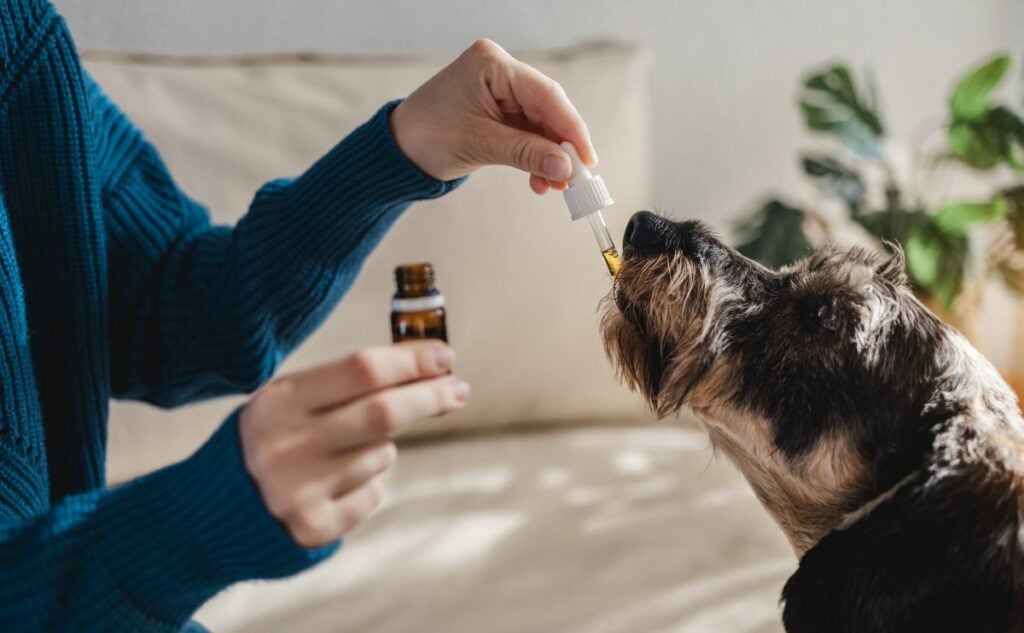
But does it actually work? And is it safe? Let’s break it all down.
What Is CBD, Really?
CBD oil is extracted from hemp (a variety of cannabis with low THC). It’s legal in all 50 states as long as it contains less than 0.3% THC.
No, your dog’s not going to get high. CBD is about balance, not buzz. Your pup isn’t about to throw on shades and raid the fridge for munchies.
The benefits of CBD oil for dogs go beyond the hype—especially when it’s used properly and in the right formulation.
But Wait, Is CBD The Same As Hemp Oil?
Nope. It’s confusing but important.
- CBD oil is extracted from hemp leaves, flowers, and stalks—where the cannabinoids live.
- Hemp seed oil comes from the seeds and has no therapeutic CBD content.
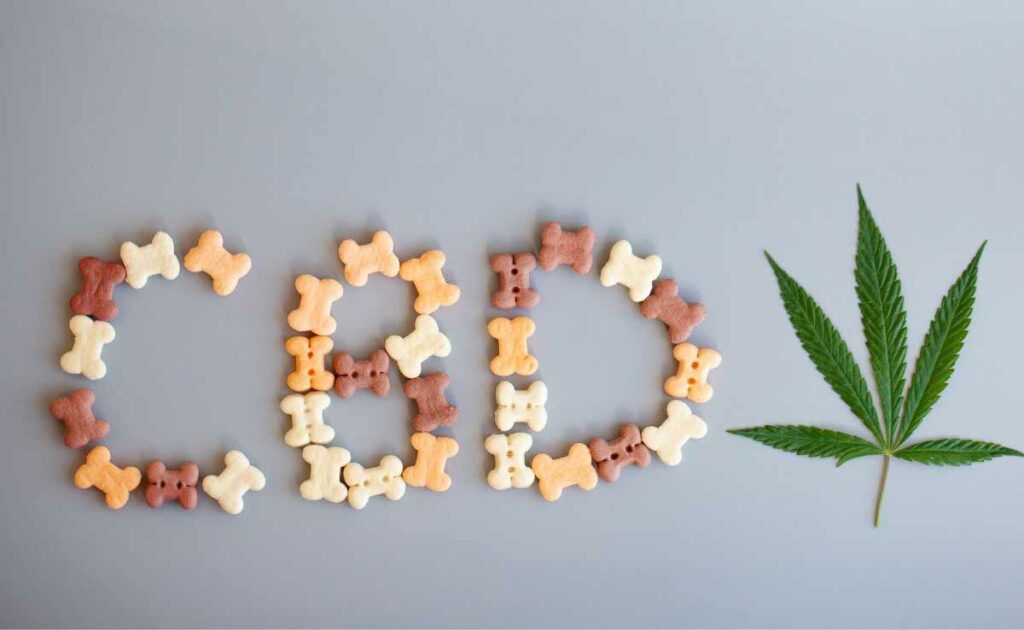
If you’re buying a product for anxiety or arthritis, make sure it says “CBD” on the label—and check for a certificate of analysis (COA) to prove it.
Here’s a side-by-side comparison to make it crystal clear:
| Feature | CBD Oil | Hemp Seed Oil |
|---|---|---|
| Source | Leaves, flowers, stems | Seeds only |
| Contains CBD? | Yes | No—not even trace amounts |
| Key Use | Therapeutic (pain, anxiety, etc.) | Nutritional (omega fatty acids, vitamins) |
| Best For | Calming, joint support, inflammation | Skin & coat health, general nutrition |
These oils can work well together, but they are not interchangeable.
How CBD Supports Your Dog’s Body
Like humans, dogs have an endocannabinoid system (ECS)—a complex cell-signaling network made up of naturally occurring endocannabinoids and specialized cannabinoid receptors found throughout the body. The ECS helps keep the body in homeostasis, or biological balance, by regulating key processes like inflammation, pain, stress response, and immune function.
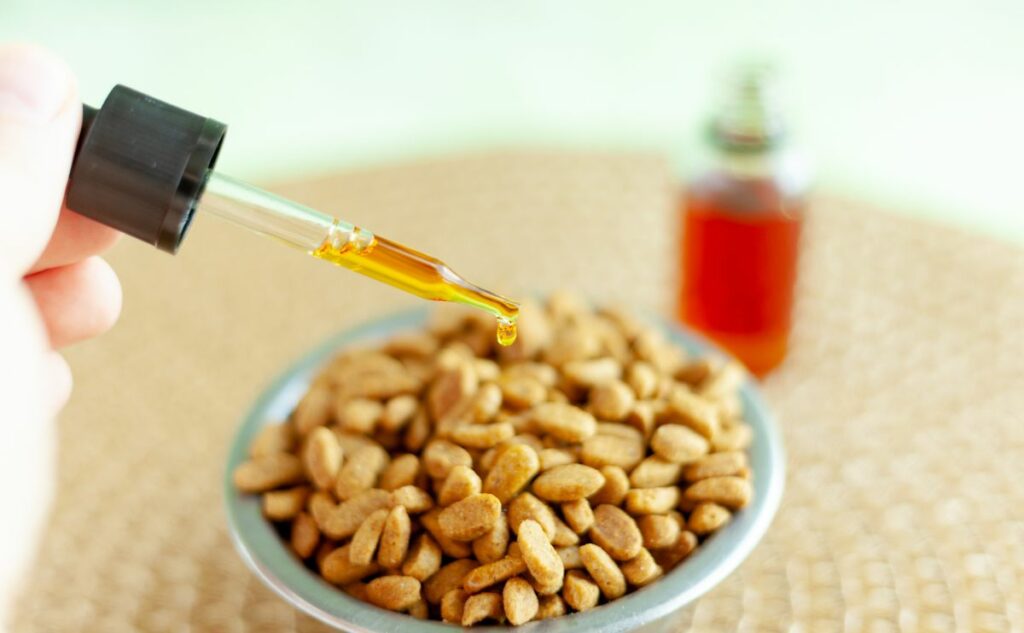
Interestingly, it’s called the endocannabinoid system because it was discovered while studying how cannabis-derived compounds interact with the body.
CBD interacts with two primary receptor types in this system:
- CB1 receptors, which are found mostly in the brain and nervous system. These influence mood, fear response, appetite, and coordination.
- CB2 receptors, which are spread throughout the immune system and help manage inflammation and pain.
CBD doesn’t bind directly to these receptors like THC does. Instead, it helps modulate them—enhancing how the ECS responds and restores balance when something’s off.
By interacting with these pathways, CBD may help reduce anxiety, calm inflammation, ease chronic pain, and support overall wellness. And when paired with other cannabinoids, the effects can be even more powerful (thanks to the entourage effect—more on that later).
Cannabinoid receptors have been found throughout the canine body—including the skin, joints, GI tract, nervous system, and even embryonic tissue—suggesting that dogs may benefit from CBD as humans do. That’s why so many pet owners are exploring the benefits of CBD for dogs across a variety of health conditions.
Can CBD Help Dogs With Anxiety?
Short answer: Yes, and it’s not just wishful thinking.
A 2023 study in Frontiers in Veterinary Science found that a single dose of cannabidiol (CBD) positively influences measures of stress in dogs during separation and car travel. A single dose of 4 mg/kg CBD two hours before these events reduced several indicators of acute canine stress, which is likely to improve emotional wellbeing.
Additionally, studies show that CBD—even at high doses—does not cause anxiety, and may help regulate emotional responses under stress.
The benefits of CBD oil for dogs dealing with chronic stress, overexcitement, or anxiety are increasingly supported by both data and real-world feedback.
What About Pain & Arthritis?
If your dog is limping or struggling to jump on the couch, CBD could help.
A Cornell University study found that more than 80% of the dogs with osteoarthritis who received CBD saw significant pain relief and increased mobility—with no adverse effects.
CBD reduces inflammation and may block pain signals in the nervous system. That’s why older dogs or breeds with joint issues (like Labs or German Shepherds) often benefit the most. This is one of the most talked-about benefits of CBD for dogs in their golden years.
11 Potential Benefits Of CBD For Dogs
While not all of these effects have been proven specifically in dogs, research in humans and other animals—combined with emerging veterinary findings—suggests CBD and other cannabinoids may offer a wide range of therapeutic benefits:
- Analgesic properties (pain relief)
- Anticancer potential
- Antiepileptic properties (seizure support)
- Anti-inflammatory action
- Antipsychotic potential
- Anxiolytic effects (anxiety relief)
- Appetite stimulation
- Gastrointestinal regulation (nausea, vomiting, appetite modulation, diarrhea)
- Immune system modulation
- Neuroprotective effects
- Skin and allergy support (inflammatory skin diseases, wound healing, itchiness)
An AKC Canine Health Foundation-funded clinical trial found that oral CBD, when added to traditional antiepileptic treatments, reduced seizure frequency in dogs by up to 33%.
Is CBD Safe For Dogs?
The evidence says yes—when used properly.
A long-term safety study published in 2022 followed 40 healthy dogs given a once-daily oral dose of 4 mg/kg of THC-free CBD for six months. The results showed CBD is well tolerated and did not cause any adverse effects in clinically healthy dogs.
That said, another study using a 1:20 THC:CBD extract found some adverse effects—mostly in the high-dose group. While administration of cannabinoid-rich hemp extract (CHE) was generally well-tolerated, dogs in the high-dose group experienced temporary neurological signs like hyperesthesia (overreacting to light, sound, or touch) and proprioceptive deficits (difficulty sensing the position or movement of limbs, which can affect coordination).
Other adverse events in the high-dose group included ptyalism (excessive drooling) in one dog, urinary incontinence in one dog, and vomiting in three of six dogs. Notably, no adverse events were reported in the low-dose group.
How To Use CBD For Dogs Safely
- Use pet-specific CBD. Human formulas might contain xylitol or unsafe additives.
- Start low and slow. Keep reading to see our dosage guidelines.
- Monitor. Rare side effects include drowsiness or upset stomach.
Always check with your vet, especially if your dog is on medication.
CBD Oil For Dogs Infographic
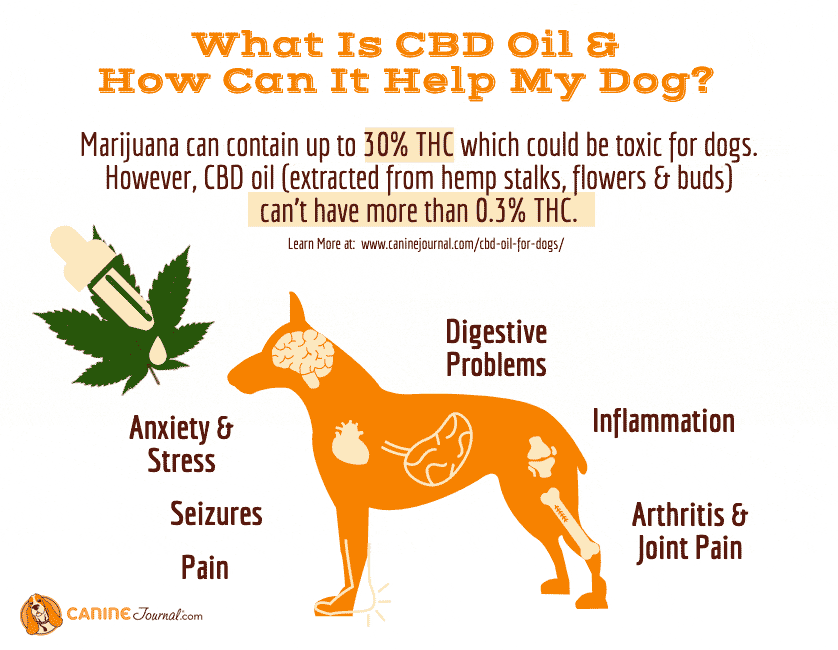
Beyond CBD: What About CBDA & Other Cannabinoids?
CBD might be the headliner, but it’s no solo act. Other cannabinoids—like CBDA (cannabidiolic acid)—are gaining attention for their unique therapeutic potential. Think of them like CBD’s lesser-known but equally talented cousins.
Meet CBDA—CBD’s Raw Form
CBDA (cannabidiolic acid) is the raw, unheated version of CBD. It may be even more potent for inflammation and pain. Recent research suggests CBDA is more bioavailable than CBD (your dog might absorb it better), while offering major anti-inflammatory benefits.
One product example is Austin & Kat Bakko’s Hip & Joint Formula, which combines both CBD and CBDA with synergistic ingredients like glucosamine and chondroitin for added joint support—great for aging dogs or those with mobility issues.
Some products also retain CBDA by using raw or cold-processed hemp extracts. Check the product’s COA to confirm.
What’s This “Entourage Effect” Everyone Mentions?
CBD appears to work better with its friends.
The “entourage effect” describes how cannabinoids, terpenes, and flavonoids work synergistically to enhance results.
Full-spectrum CBD products often include:
- CBC (cannabichromene): May amplify pain relief
- CBG (cannabigerol): Neuroprotective, anti-inflammatory, antibacterial
- CBN (cannabinol): Mildly sedating—possibly beneficial for sleep and nighttime anxiety.
- THCV (tetrahydrocannabivarin): Being studied for anxiety and appetite
- Terpenes like beta-caryophyllene: Add anti-inflammatory and calming effects
Emerging research is still catching up to anecdotal results, but many holistic vets are already recommending full-spectrum products that naturally contain a range of these cannabinoids in small, synergistic amounts.
Bottom line: Look for full-spectrum or broad-spectrum formulas for a more comprehensive therapeutic profile.
What About Cannabinoid-Like Compounds? (Hint: PEA Is A Big Deal)
CBD and its cannabinoid cousins aren’t the only compounds supporting your dog’s endocannabinoid system. Palmitoylethanolamide (PEA) is a naturally occurring fatty acid amide produced by the body—and it’s gaining serious attention in veterinary science.
- PEA works as an “indirect endocannabinoid,” influencing the ECS without directly interacting with cannabinoid receptors.
- It’s shown promise for chronic pain, neuropathic pain, inflammation, and allergies.
- Since PEA doesn’t come from cannabis, it’s an excellent option for pet parents looking for THC-free, hemp-free relief—especially in dogs who are sensitive to cannabinoids or on multiple medications.
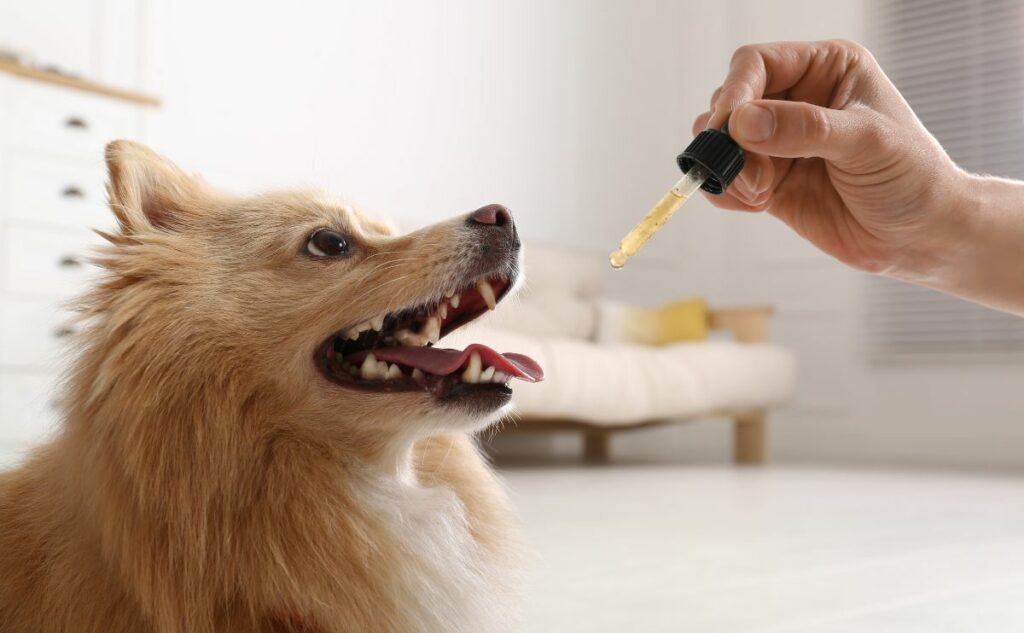
Several supplements now include ultra-micronized PEA (PEA-um), which boasts higher bioavailability. One example is Redonyl Ultra, a hypoallergenic formula supporting skin health and inflammatory response.
How To Choose High-Quality CBD For Dogs
Choosing a quality product is crucial. Here’s 6 things to look for:
- Clear labeling: Avoid vague terms like “hemp extract.” You want to see milligrams of CBD per serving.
- CO2 extraction: This clean method preserves cannabinoids without chemical solvents.
- Full-spectrum or broad-spectrum: CBD might be the headline act, but CBDA and friends are the powerful backup singers.
- Organic hemp: Avoid pesticides and toxins. Hemp soaks up everything in the soil.
- Third-party lab testing: Look for a Certificate of Analysis (COA) showing exact CBD/THC levels and confirming it’s contaminants-free.
- Less than 0.3% THC: To keep it non-psychoactive and safe for pets.
Full-Spectrum vs Broad-Spectrum vs CBD Isolate: What’s The Difference?
You’ve probably seen terms like full-spectrum or CBD isolate on pet product labels—but what do they actually mean?
- Full-Spectrum CBD: Contains all the naturally occurring cannabinoids (including trace amounts of THC under 0.3%), terpenes, and flavonoids. This is thought to enhance effectiveness through the entourage effect—a theory that cannabinoids work better together.
- Broad-Spectrum CBD: Includes most cannabinoids and beneficial plant compounds but with THC completely removed. Great for dogs who may be sensitive to THC or for owners who prefer a THC-free option.
- CBD Isolate: Pure cannabidiol, with all other cannabinoids and compounds stripped out. It offers consistent potency but may be less effective without those synergistic plant elements.
TL;DR: Full-spectrum = whole plant power, broad-spectrum = THC-free synergy, isolate = pure and precise.
Processing Methods Matter (A Lot)
How CBD is extracted plays a massive role in its safety and effectiveness—especially for pets.
- CO₂ Extraction: Clean, solvent-free, and preserves cannabinoid and terpene content. This is the gold standard in pet products.
- Ethanol Extraction: More affordable, but if not done correctly, it can leave behind residues. Look for brands that use food-grade ethanol and test for purity.
- Hydrocarbon Extraction (e.g., butane or propane): Often used in vape products—not ideal for pets. Residual solvents can pose health risks.
- Nano-Emulsification: Buzzword alert. This method breaks CBD into tiny particles for faster absorption. Sounds great, but it’s not always necessary—and may be more marketing hype than actual benefit.
When in doubt, check the product’s COA for clarity on extraction method and purity.
3 Red Flags To Watch Out For
Avoid brands that:
- Don’t publish third-party lab results
- Use vague labeling , like “hemp extract,” with no CBD content listed
- Claim to “cure” anything (it’s a supplement, not a miracle)
How Much CBD Should I Give My Dog?
Need help calculating the perfect amount? Start low and go slow. Use this CBD dosage chart and guide for dogs to make dosing simple and safe.

Always talk to your vet first. That said, a typical starting dose is:
- 0.2 mg to 0.5 mg of CBD per pound of body weight twice daily
For example:
- 25 lb dog: 5–12 mg per dose
- 50 lb dog: 10–25 mg per dose
Start on the low end, observe for 3–7 days, and adjust as needed.
When To Consider CBD For Your Dog
CBD can be helpful for both chronic conditions and situational stress:
- Aging joints & arthritis
- Cancer treatment support
- Noise sensitivity (storms, fireworks)
- Post-surgery recovery
- Travel stress or crate anxiety
Real-Life Feedback
I work at a health food store that also caters to pets. Over the years, I’ve heard overwhelmingly positive feedback regarding people giving CBD oil to their dogs.
What makes this supplement so unique? CBD supports the endocannabinoid system (ECS), which maintains homeostasis, or balance, in the body. Because of the modulatory role of the ESC, CBD offers potential therapeutic benefits for various body processes, including immune function, cognition, stress response, metabolism, and inflammatory responses. That said, the two most frequent conditions I see this supplement used for are pain and anxiety.
I’ve heard countless stories of dogs struggling with joint pain getting the pep back in their step after starting CBD. It’s also a popular selection for dogs with anxiety. In particular, it’s an excellent choice for supplementing during times of high stress, such as during Fourth of July fireworks or trips to the vet.
– Tara Maurer, Retail Health Consultant & Canine Journal Writer
Top-Rated CBD Brands For Dogs
Whether you’re looking for brands we’ve reviewed or exploring others trusted by industry experts, here’s a lineup of quality options worth considering:
| Brand | Key Features | Why We Like It | Read Our Review |
|---|---|---|---|
| Canna-Pet | Pioneer in pet CBD, full-spectrum, Organic hemp | For dogs, cats & horses, various formulas | Canna-Pet Review |
| cbdMD Pets | Broad-spectrum (THC-free), significant source of CBG & CBN | Various formulas, NASC quality seal, COAs available online | cbdMD Review |
| Charlotte’s Web | Legacy hemp brand, full-spectrum, made with human-grade CBD extract | Various formulas, NASC quality seal, Non-GMO certified, COAs available online | |
| Cornbread Hemp | Full-spectrum, organic ingredients | For dogs & cats, use flower only, COAs available online | |
| HempMy Pet | Full-spectrum, organic hemp, topical or oral use | Hemp extract available in 3 base options (hemp seed, coconut, or olive oil) | HempMy Pet Review |
| Holistapet | Broad-spectrum CBD oil, membership discount | Specific pet formulas (dogs, cats, horses), CBG oil available, COAs available online | Holistapet Review |
| Honest Paws | USDA organic, full-spectrum, membership discount | Lots of options for dogs & cats, COAs available online | Honest Paws Review |
| King Kanine | Full-spectrum, CBD oil by breed (multiple potencies), CBD topicals | Good for large breeds, COAs available online | King Kanine Review |
| PlusCBD | Options for full-spectrum, broad-spectrum, and CBD isolate; human-grade quality | For dogs & cats, various formulas, NASC quality seal, COA available online |
There are a lot of CBD products on the market for pets, so we weeded through them all to find the highest quality CBD products for your pup. Be sure to read our reviews of the best CBD oil for dogs and the best CBD treats, which include extensive pros and cons, ingredients, pricing, and more.
Bonus: Create A CBD Tracker For Your Dog
Keep a daily log for:
- Time of dose
- Dosage (mg)
- Observed changes (energy, appetite, mobility, mood)
This helps fine-tune dosing and gives your vet data to work with.
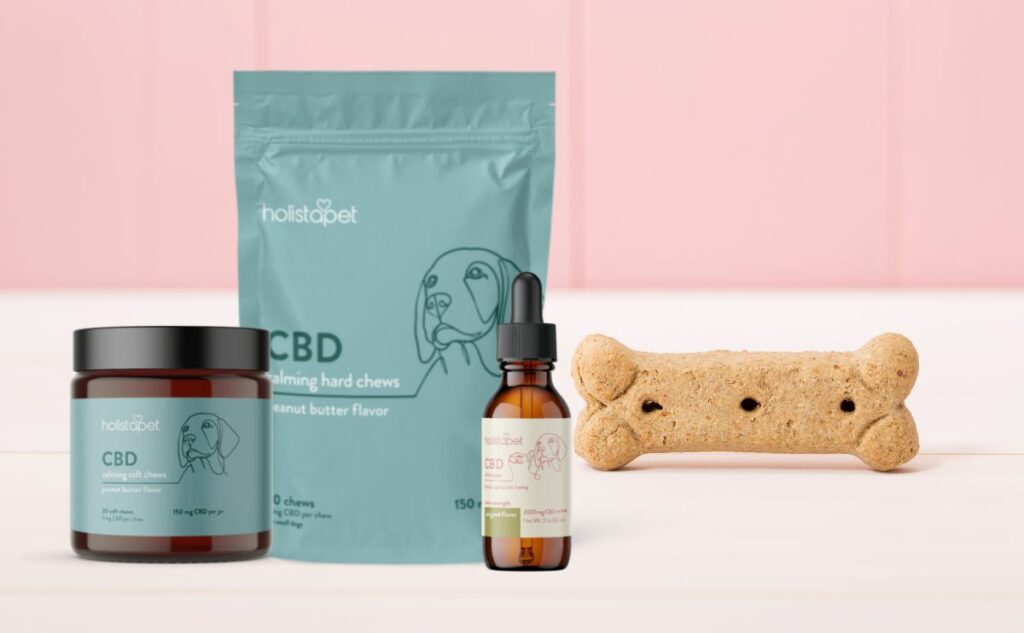
Frequently Asked Questions: CBD Oil For Dogs
Still have questions about the benefits of CBD oil for dogs? You’re not alone.
Whether you’re brand new to CBD or want to be sure you’re doing right by your pup, this section tackles dog parents’ most common concerns—with clear, no-nonsense answers. Don’t see yours? Ask us in the comments!
Will CBD Make My Dog High?
Nope. CBD is non-intoxicating and contains less than 0.3% THC. Your dog won’t be hallucinating about squirrels.
How Long Does It Take To Work?
Some dogs show improvements in 30–60 minutes (especially for anxiety). Chronic conditions like joint pain may take a few days to a couple of weeks.
Can I Give My Dog Human CBD Oil?
It’s best to use pet-specific formulas. Human CBD may contain ingredients like xylitol or flavorings that are unsafe for dogs.
Is CBD Safe For Long-Term Use?
Generally, yes—especially when using high-quality, vet-approved products. But keep your vet in the loop for ongoing monitoring.
What If My Dog Is On Other Medications?
Always consult your vet before adding CBD to your dog’s wellness routine.
Learn More About CBD For Dogs
Ready to go deeper? Explore these trusted resources for more insights, product reviews, and expert advice:
Whether you’re using it to calm nerves or soothe joints, CBD oil could be just what your pup needs to feel like themselves again.
Why Trust Canine Journal?
Tara is a writer for Canine Journal, specializing in health and nutrition. She has worked in the wellness industry for 8+ years, advising pet parents on supplements and nutrition for their furry friends. Tara has personally seen the benefits of CBD with her pets and hopes to educate people on this and other holistic solutions for well-being.

